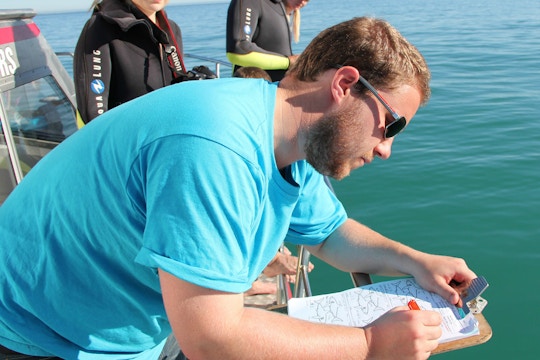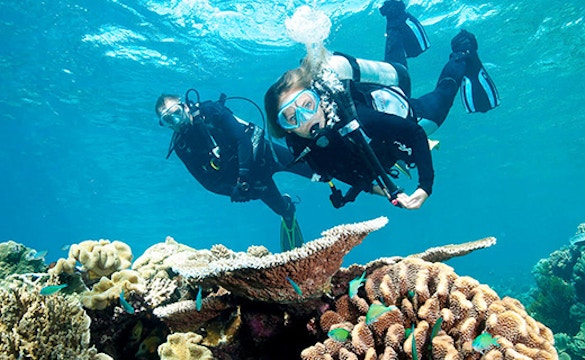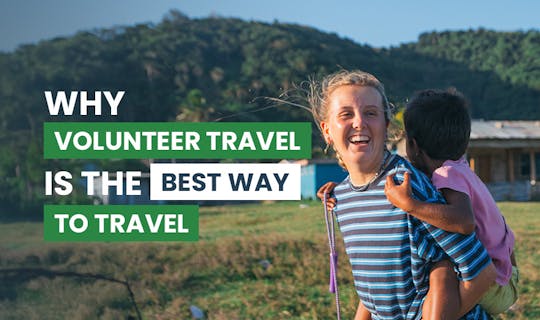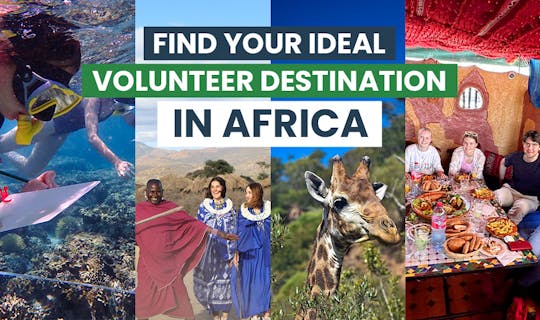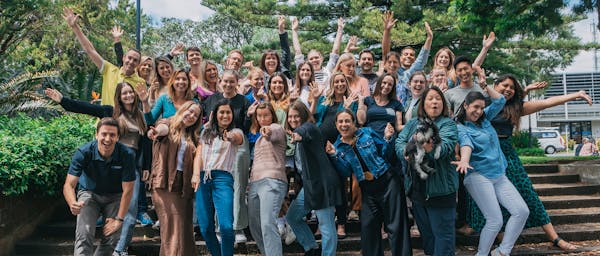I would advise someone hesitant about joining this program to just do it! The people running the program are very welcoming and helpful, and the other volunteers are people who are also there to help which especially good for those traveling alone.

Marine Conservation Volunteer Program in Belize
Purpose
Start dates
Duration
Volunteer hours
Age
Accommodation
Who is going?
Group video calls
Once you have secured your place, join regular video calls to meet your Program Manager and other volunteers before your trip.
This program is ideal for:
Project details
Ready to dive into a new adventure as a Marine Conservation volunteer in Belize? International Volunteer HQ’s Marine Conservation project is set on a tiny private island in the Caribbean where volunteers have the opportunity to help with the efforts to eradicate the invasive Lionfish and conserve and preserve the stunning marine environment. Volunteers will scuba dive at least twice a day in various locations to assist with biodiversity (fish, invertebrates, and coral) identification dives and remove invasive species.
What to expect and how you'll make an impact
Climate change, pollution, development and the introduction of invasive species have seen coral reefs all over the world suffer and deteriorate. The Caribbean is no exception and its reefs have been showing the detrimental effects of increasing numbers of non-native Lionfish. This volunteer project in Belize has taken a proactive approach to help the marine ecosystems recover and ensure their health and survival long-term, by focusing on the management of the invasive Lionfish species.
Lionfish are a non-native, invasive species without natural predators. A single female can lay up to 2 million eggs each year, and they eat almost anything. The Marine Conservation project in Belize focuses on reducing the number of this invasive species from the reef ecosystem. People often feel that “releasing” a fish or any other animal into the wild is a good thing, but not in the case of the Lionfish, which is not indigenous to the Atlantic and Caribbean Oceans. In the Atlantic and Caribbean Oceans they are an invasive predator, feeding on reef species that are key to healthy reef ecosystems, however; in the Caribbean the native reef species have no evolutionary defense mechanism against the invasive lionfish.
Volunteers will take part in daily spearfishing to control the invasive, reef-destroying Lionfish and can expect to take part in 12-13 dives each week which will be a combination of both shore dives and boat dives. This usually works out to be two dives on Monday, three dives on Tuesday through to Thursday, one dive on Friday, and at least one night dive.
On the Marine Conservation project activities vary depending on the season, but can include:
- Invasive Lionfish population control and monitoring (spearing and dissecting lionfish).
- Learning about coral reefs and marine animals and discovering how we can protect our reefs from a warming planet.
- Biodiversity (fish, invertebrates, and coral) identification dives to increase one’s knowledge and understanding of coral reef ecosystems.
- Weekly beach and island trash/plastic removal on islands of the Belize Barrier Reef.
Why do Marine Conservation volunteering in Belize with IVHQ?
When you join the Marine Conservation project in Belize, you’ll be helping protect the extraordinary natural environment while getting hands-on conservation experience and achieving personal growth by:
- Helping keep endangered marine life safe and healthy
- Scuba diving around Belize’s Barrier Reef
- Gaining experience in marine conservation
- Learning about the effects of climate change
- Discovering the beautiful islands of the Caribbean
Volunteer requirements
- In order to participate in the Marine Conservation project, you must be a competent swimmer and have an Open Water Dive Certification. This certification can be obtained while volunteering on the island, or in advance of your trip.
- Young people over 12 years of age are able to volunteer on this project if they are accompanied by a parent or guardian.
- Volunteers aged 16 and older may be able to participate independently.
- All volunteers under the age of 18 who are traveling with one parent or guardian, or independently, will need to complete a Minor Travel Consent Form, which is required by the Belize government and international airlines. Independent volunteers under the age of 18 years will be required to provide additional waivers and documentation, which a guardian must complete. All volunteers aged 13+ are required to provide a criminal background check to IVHQ prior to departure. Those aged 13-17, if unable to obtain a criminal background check, can provide two character reference letters instead All volunteers are required to have adequate volunteer travel insurance All volunteers must speak fluent English.
- All volunteers are required to have adequate volunteer travel insurance
- All volunteers must speak fluent English.
Are you eligible to volunteer?
Submit a free application so we can confirm your eligibility and check availability for your preferred dates.
Not sure which program to join?
Get personalized recommendations >
Who is going?
Group video calls
Once you have secured your place, join regular video calls to meet your Program Manager and other volunteers before your trip.
Belize photo gallery









































What recent volunteers said about their IVHQ experience
I gained more knowledge about invasive species in the Carribean, but more importantly some sort of awakening of how much one can pollute the ocean with plastics and will push me to be cautious about my environmental footprint.
Situated on a small island, it’s the perfect getaway, to be remote, cut from civilization and immersed with fellow divers in something that can have an impact on local marine life.
Due to huge amount of eggs a lion fish can lay, I felt as though every fish caught makes a dent in their impact. The people I met on the program helped me grow as a person and gain perspectives. I met the most amazing people, both the volunteers and the local staff, and learned so much about conservation and lots more. The dives were always amazing. Couldn’t recommend enough!
I gained independence and a great experience. It was a one-of-a-kind volunteer program and I am so glad I participated in it.
I loved interacting with the local team, making great personal and professional connections, and making great friends to travel with in the future. Take the leap and do it! I promise you there will be more positive outcomes than you can think of. This was my first solo trip, and it exceeded my expectations. Now I feel more comfortable and confident with traveling by myself and experiencing other countries/cultures in the future. I highly recommend IVHQ.
If you are doubting on whether to go or not, do it! Belize is a beautiful and mysterious place full of beautiful people and magical places. The program itself is something you´ll never forget! Every single moment on the program I felt like I was helping and I felt surrounded by people full of love. When I arrived on the island for the first time, it felt like a giant hug, like I was supposed to be there. Being on the program opens opportunities and will help you to learn about yourself.
To read all reviews, visit our reviews page.
An Open Water Dive Certification is required to participate on this project and can be obtained at the start of your project, or in advance of your trip. Belize is a wonderful place to learn with calm clear waters and little current. You will also need to complete an online e-learning course, which is an additional cost, and must be completed prior to arriving in Belize.
The PADI dive certification courses offered in Belize are as follows:
Get your PADI Open Water Dive Certification in Belize
- Open Water Certification (3 days) – $237
- Advanced Open Water Certification (3 days) – $287
- Rescue Diver Certification (1 week)– $337
- Divemaster Certification (4 week minimum stay) – $762
Additional PADI Specialties with a Marine Conservation Focus
- Invasive Lionfish (3 days) – $187
- Coral Reef Conservation (3 days) – $187
- Fish Identification (3 days) – $187
- Shark Conservation (2 days) – $187
- Underwater Naturalist (2 days) – $187
Additional PADI Specialties with a Diving Skills Focus
- Deep Diver (3 days) – $187
- Emergency First Response (2 days)– $187
- Underwater Photographer (2 days) – $262
- Underwater Navigator (3 days) - $187
When you apply for this project, please specify whether you are Open Water Dive Certified, or whether you will be taking the Open Water Dive certification in Belize. If you wish to take additional dive certification courses on the project, please also specify this on your application.
Dive equipment is available for hire for an additional $25 per week, which is paid directly to the local team in-country. Please note, this excludes masks with snorkel, booties, wetsuits (long or short, 3mm minimum), and dive fins, which volunteers must bring themselves.
Please Note: The PADI Open Water, Advanced, Rescue, Divemaster, Deep Diver, Emergency First Response, Underwater Navigator, and Underwater Photographer courses require the PADI eLearning prior to arrival. All other courses do NOT require the PADI eLearning prior to arrival. You must be a fully certified open water diver before taking any PADI specialty courses.
Academic course credit

Academic course credit
Gain course credit from your college or university and meet your academic requirements when completing a volunteer abroad program with International Volunteer HQ!
Learn about course creditLocation

Location
Set on a tiny private island 45 minutes off the coast of Belize, volunteers at IVHQ’s Marine Conservation project will have an incredible opportunity to stay in and dive around the Caribbean. The island is warm, sunny and remote so you’ll be able to rest and relax when you’re not out exploring the breathtaking beauty of the area and its marine life.
Volunteers will stay on the island from Monday to Thursday before being taken back to Placencia, on mainland Belize, by boat on Friday. Volunteers will need to arrange and pay for their own accommodation on Friday, Saturday and Sunday nights. There is a range of accommodation options to choose from in Placencia, or you can choose to explore other parts of Belize during the weekends. The boat will take you back to the private island again on Monday if you are staying more than a week.
Arrival and orientation
The program begins every Monday and volunteers need to arrive in Placencia on the Sunday before their program begins. On Monday, volunteers travel by boat from Placencia to the island where the program is based. This transfer is included in the Program Fee.
After you have registered for the program, please book your flights to arrive at Placencia Airport (PLJ) on the Sunday before your program start date. Please note that flights to Placencia Airport need to be booked to depart from Philip S.W. Goldson International Airport (BZE) in Belize City. The airlines that fly from Belize City to Placencia are Maya Island Air and Tropic Air.
Once you have arrived in Placencia, you will need to take a taxi to the accommodation that you have booked for Sunday night. There are a number of taxis at the airport and the fare into town should cost between US$5-US$10. Accommodation on the private island is provided from Monday to Thursday each week. If you are staying for 1 week, you will need to book your own accommodation on the mainland for the Sunday before your program start date and for the Friday night when you arrive back to the mainland. If you are staying longer than 1 week, you will also need to arrange accommodation for the weekends during your program.
If you are traveling in Belize prior to your volunteer program, we can arrange for you to meet up with the local team in Placencia on the morning of your program orientation.
The program orientation will be held on the island when you arrive on Monday. The orientation is hosted by the local team and includes an introduction to the IVHQ Belize Program, rules and expectations, health and safety, and an introduction to the local marine ecosystem. Orientation will also give you a chance to get to know the other volunteers who you will be living on the island with.
Volunteer schedule example
First Day
On your first day of volunteering, you will be taken by boat out to the island, have orientation and lunch, then begin the project work or your dive certification.
Weekdays
Full days on the island typically include three dives, on Mondays and Fridays you will have one or two dives. Please note the daily schedule will vary depending on the project goals and if you are working on your dive certification. A typical volunteer day is as follows:
| 6:30 AM | Fruit, tea and coffee at the volunteer accommodation |
| 7:30 AM | Volunteers begin work at the project |
| 9:00 AM | Breakfast at the volunteer accommodation |
| 10:30 AM | Volunteers continue work on the project |
| 12:30 PM | Lunch is served at the volunteer accommodation |
| 3:00 PM | Work at the project continues |
| 6:30 PM | Dinner and relaxing at the volunteer house |
Weekends
Volunteers will stay on the island from Monday to Thursday before being taken back to Placencia, on mainland Belize, by boat on Friday. Volunteers will need to arrange and pay for their own accommodation on Friday, Saturday and Sunday nights. There is a range of accommodation options to choose from in Placencia, or you can choose to explore other parts of Belize during the weekends. The boat will take you back to the island again on Monday.
If you’re spending your weekend in Placencia, you’ll be able to relax on the palm-tree lined white sand beaches, hire kayaks or paddle boards and even take yoga classes. There are also ancient Mayan sites, spice farms and waterfalls you can visit within a day’s trip from Placencia. Further afield, you can visit Caye Caulker, Great Blue Hole, Caracol, Ambergris Caye or San Pedro.
Accommodation and WiFi
On the Belize program, you will stay on a small private island in a volunteer house. The accommodation on the island is comfortable but basic. Bedrooms are located in the main house or in cabanas. The bedrooms have single or double beds and you can expect to share a room with up to four other volunteers. Most bedrooms have an attached bathroom, and there are basic cold showers and flush toilets. Bedding is provided, however due to the hot climate, most volunteers sleep with just a sheet and some may choose to sleep with the doors open.
Regardless of the bedroom you have, you will have ocean views and wake up naturally with the sun and to the sound of gentle waves crashing. In your spare time you can go stand up paddle boarding, snorkeling and fishing; have a game of volleyball or badminton with your fellow volunteers or just relax in a hammock or on the beach.
Power is delivered to the volunteer accommodation by an on-site generator and the generator will usually run for up to 2 to 4 hours per day to charge electrical equipment. Volunteers are encouraged to minimize the amount of electronic equipment they bring, as the camp only has limited power points available to charge devices. We recommend volunteers bring solar chargers to charge their devices, if possible.
There is no Wifi or cell phone reception on the island which means you won’t be able to send text messages or make phone calls. If you need to check in with family and friends you’ll need to do this before you arrive and when you depart from the island.
The island is isolated and you will not be able to go back to the mainland during the week. The return trip to the mainland is on Friday. Due to the remote location, it’s important that you bring everything you need for the week to the island on Monday.
Please note your accommodation is covered Monday through to Thursday night while on the program. You will need to book accommodation in Placencia for your first night (Sunday) and on the weekends (Friday through Sunday). As soon as you register for the program, the local team will provide a variety of accommodation recommendations to suit all budgets. Accommodation options in Placencia range in price from $15 per night to $150+ per night depending on the type of accommodation you choose.
Meals
You will be served three tasty meals each day by the on-site cook. The meals are fresh, varied and balanced, and you can expect corn tortillas, beans, polenta, stir-fried vegetables, coconut curry, fresh seafood and sometimes other meats.
Please note that you will not be able to purchase food on the island or go back to the mainland during the week, so it’s important to bring snacks with you. Keep in mind that you will be diving three times per day which means you may need to eat more than normal. You can easily stock up on high energy snacks in Placencia and take them out to the island with you. Nuts, oats and bananas are all great high energy food options. There is plenty of drinking water on the island so please bring a reusable drink bottle.










Pricing
Spots are limited. For a Registration Fee of just US$299 (approximately $299) you secure your spot and unlock all our preparation and training tools.
You don't need to worry about paying your Program Fee until you get closer to your start date.
Duration |
Program FeeDue 30 days before you start, or within 48 hours if you register inside of 30 days. Covers the cost of hosting you.
|
|---|---|
| 1 week | $1,060 Equivalent to $212/day |
| 2 weeks | $1,985 Equivalent to $199/day |
| 3 weeks | $2,910 Equivalent to $194/day |
| 4 weeks | $3,835 Equivalent to $192/day |
| 5 weeks | $4,760 Equivalent to $190/day |
| 6 weeks | $5,685 Equivalent to $190/day |
| 8 weeks | $7,535 Equivalent to $188/day |
- All programs attract a Registration Fee of US$299 (approximately $299) in addition to the Program Fee. This covers all pre-departure support services.
- A 5% international banking fee is added at point of payment.
- Recommended spending money: Volunteers in Belize generally find US$200 to be sufficient for basic weekly expenses, including accommodation and meals on the weekends, and miscellaneous spending.
- Please note: Volunteers will need to budget an extra US$30 per week for Marine Conservation Park fees, US$30 per week for dive gear rental and a US$50 fuel surcharge.
- Any changes or cancellations within 14 days of your start date are subject to a US$550 late change/cancellation fee.
- Meals (Monday lunch to Friday breakfast)
- Accommodation
- 24/7 in-country support
- In-country program orientation
- Pre-departure support from your Program Manager
- Personalized preparation tools, guides and check lists
- Access to IVHQ’s preferred insurance and flights partners
- Discounts on travel and tour add-ons
- Certificate of International Volunteer Service
Learn more about what's included in your IVHQ Registration Fee and Program Fee.
- Accommodation and meals on weekends
- Airport pick-up
- Return to the airport when your program finishes
- Flights
- Visa (if required), travel insurance (mandatory), vaccinations, criminal background check.
- Personal spending money for snacks, laundry, public transportation, drinks and leisure activities during your free time.
Check what's required to visit Belize
Safety and support
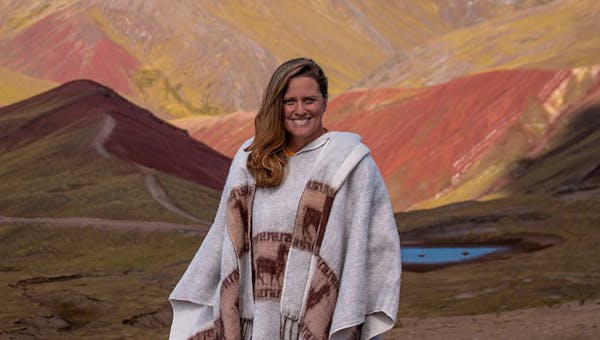
Safety and support
IVHQ follows best practice and industry-leading health and safety procedures, which are regularly reviewed and optimized as part of the B Corporation recertification.
- All volunteers encouraged to complete our interactive pre-departure training.
- All local teams trained on best practice volunteer management & First Aid.
- All IVHQ programs are required to adhere to IVHQ's Risk Management Policy.
- All volunteers have access to 24/7 in-country support from our local team.
Essential country information
Essential country information
| Capital | Belmopan |
| Population | 366,000 |
| Languages | English, Spanish, Creole |
| Currency | Beliza Dollar (BZD) |
| Time zone | UTC-06:00 |
Weather and climate
Belize has a tropical climate year-round which means visiting at any time during the year is enjoyable. December to February are the coolest months, the average temperature is around 75°F (24°C). The rainy season runs from June - October the average temperatures are around 81/82°F (27/28°C), with highs around 86/90°F (30/32°C). You can expect light winds out on the island year-round.
Latest blog posts
Other projects you may be interested in






















